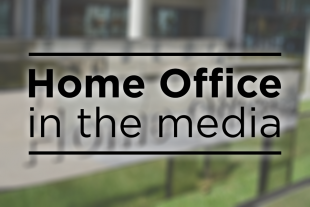
Today's Home Office-related stories including a Border Force seizure, a Court of Appeal ruling on the Data Retention and Investigatory Powers Act and Tier 2 visas.
Drugs seizure
A variety of national and regional media, including on BBC News, ITV News, the Daily Mail, the Sun and Sky News, have reported on Border Force officials seizing an estimated 500 kilos of drugs at Farnborough airport.
Please find comments below from Border Force Deputy Chief Operating Officer Mike Stepney and NCA operations manager Siobhan Micklethwaite.
Border Force Deputy Chief Operating Officer Mike Stepney said:
Working with law enforcement colleagues like the National Crime Agency (NCA) we are determined to prevent drug trafficking and bring those responsible to justice.
This was a significant find made possible by the vigilance of dedicated Border Force officers. They have prevented a substantial quantity of drugs from ending up on our streets and causing untold misery and damage to our communities.
After meeting the flight and questioning those on board, officers became suspicious and searched the aircraft and their luggage. When opened, each case was found to contain between 34 to 37 tape wrapped packages weighing approximately one kilo each. One of these was pierced and a white powder exposed which tested positive for cocaine.
NCA operations manager Siobhan Micklethwaite said:
This is a major seizure of cocaine, one of the largest flown into the UK by plane in many years, and this seizure by Border Force represents a major blow to organised crime.
We estimate that once cut and sold on the streets in the UK it would have had a potential value in excess of £50 million.
Our investigations into this attempted importation are continuing.
DRIPA ruling
There is coverage in the Guardian and Mirror on the Court of Appeal judgment in relation to some powers in the Data Retention and Investigatory Powers Act (DRIPA) regarding mass digital surveillance.
The papers note that the Court of Appeal found that some of the powers were “inconsistent with EU law”.
Please find the Security Minister’s reaction to the story below.
Security Minister Ben Wallace said:
Communications data is used in the vast majority of serious and organised crime prosecutions and has been used in every major Security Service counter-terrorism investigation over the last decade. It is often the only way to identify paedophiles involved in online child abuse as it can be used to find where and when these horrendous crimes have taken place.
This judgment relates to legislation which is no longer in force and, crucially, today’s judgement does not change the way in which law enforcement agencies can detect and disrupt crimes.
We had already announced that we would be amending the Investigatory Powers Act to address the two areas in which the Court of Appeal has found against the previous data retention regime. We welcome the fact that the Court of Appeal ruling does not undermine the regime and we will continue to defend these vital powers, which Parliament agreed were necessary in 2016, in ongoing litigation.
Tier 2 visas
The Financial Times reports that the Tier 2 visa monthly cap has been hit in December 2017 and January 2018. The paper says this has had an impact on foreign healthcare professionals taking jobs within the NHS.
The Home Office’s response can be found below.
A Home Office spokesperson said:
When demand exceeds the month’s allocation of Tier 2 (General) visas, priority is given to applicants filling a shortage or PhD-level occupations.
The published shortage lists include a range of medical professionals, including consultants specialising in clinical radiology and emergency medicine, and we estimate that around a third of all Tier 2 places go to the NHS.
